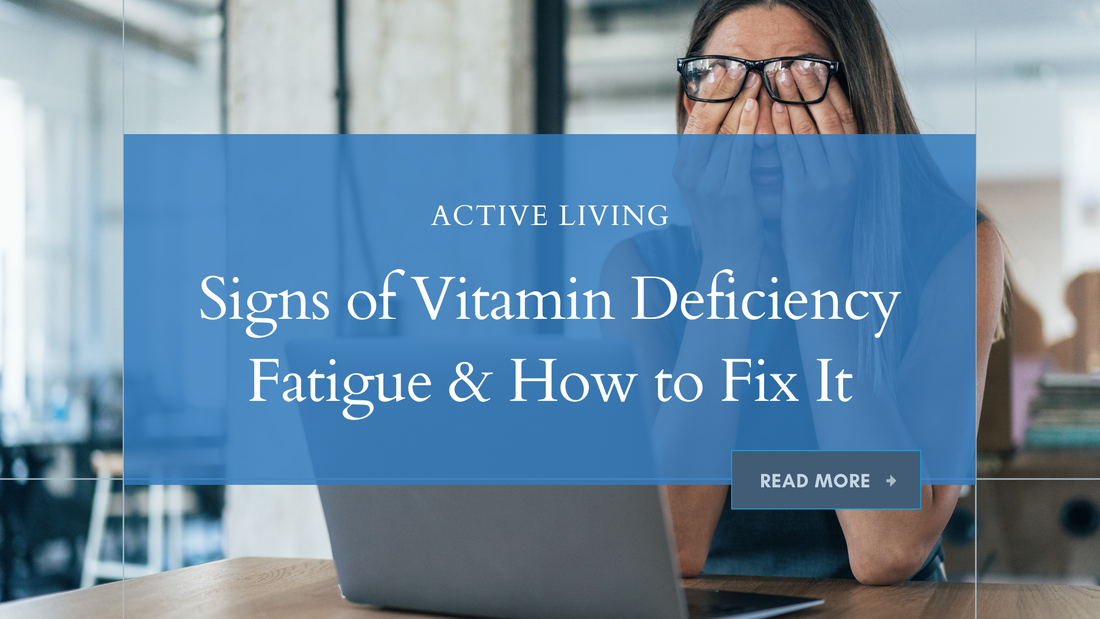Do you wake up feeling exhausted, even after a full night's sleep? Do you rely on caffeine and sugary snacks just to get through the day? If so, you might be dealing with vitamin deficiency fatigue.
This isn’t just regular tiredness. It’s a lingering, energy-draining fatigue that can make even simple tasks feel overwhelming. Many people brush it off as part of a busy lifestyle, but the truth is, your body could be crying out for essential nutrients.
Let’s dive into vitamin deficiency fatigue and, more importantly, what you can do to regain your energy and mental clarity.
Table Of Contents:
- Understanding Vitamin Deficiency Fatigue
- Recognizing the Symptoms of Vitamin Deficiency Fatigue
- Causes of Vitamin Deficiency Fatigue
- Combating Vitamin Deficiency Fatigue
- Lifestyle Adjustments to Address Vitamin Deficiency Fatigue
- FAQs about vitamin deficiency fatigue
- Conclusion
Understanding Vitamin Deficiency Fatigue
Your body needs a variety of vitamins to function at its best. Certain nutrients help convert food into energy, transport oxygen, and keep your nerves and muscles working properly.
When you're missing key vitamins, these processes slow down—leaving you feeling sluggish, weak, and mentally foggy. This persistent state of exhaustion impacts your ability to concentrate, work, exercise, and even get through the day.
The good news? Identifying and addressing these deficiencies can have a dramatic impact on your overall health and vitality.
Key Vitamins for Energy
Several vitamins are essential for maintaining energy levels. Some of the most common vitamin deficiencies include vitamin D, vitamin B12, folate, iron, and omega-3 fatty acids.
Vitamin B12 is crucial for red blood cell formation and energy production. It plays a vital role in the production of hemoglobin, a protein in red blood cells that carries oxygen to different parts of the body.
The Mayo Clinic explains that a lack of healthy red blood cells, also known as vitamin deficiency anemia, is associated with low Vitamin B12 and folate levels in the body. This can cause fatigue, shortness of breath, weakness, and more.
Without sufficient vitamin B12, red blood cells may not function properly, leading to fatigue, weakness, and shortness of breath. A deficiency in vitamin B12 can lead to a B12 deficiency anemia that affects energy production.
Vitamin D is produced by the body in response to sunlight and can also be obtained through diet or supplements. It is part of many processes, including immune function, calcium absorption, and chronic inflammation. A simple blood test can check your vitamin D levels.
Iron plays a crucial role in oxygen delivery throughout the blood. A chronic deficiency can lead to anemia, a condition characterized by a lack of red blood cells or hemoglobin. This can cause several symptoms including physical fatigue.
Omega-3 fatty acids are crucial to cognitive function, lessening oxidative stress, cardiovascular health, and overall wellness. Many people don't get enough omega-3s in their diets, which can negatively affect their health.
This is often due to a lack of fatty fish consumption, and the widespread use of vegetable oils which are high in omega-6 fatty acids. Omega-3 deficiencies can affect overall wellness, including poor heart health and fatigue.
How It Feels
Vitamin deficiency fatigue isn’t simply being more tired than usual. It’s a pervasive feeling that ranges from constant mild exhaustion and apathy to nearly disabling tiredness. Mental fatigue, “brain fog,” and depression may also result, as described in reports at the National Institutes of Health (NIH).
What Can Cause Vitamin Deficiency Fatigue
Several factors could be depleting your nutrient levels, such as:
-
Poor diet – If you’re not eating enough whole foods, you could be missing vital nutrients.
-
Aging – As we get older, our bodies absorb vitamins like B12 less efficiently. This makes it important to choose B complex supplements with active forms of B vitamins.
-
Health conditions – Digestive disorders, autoimmune diseases, and even chronic stress can interfere with nutrient absorption.
-
Medications – Some prescriptions, including antacids and birth control pills, can deplete essential vitamins.
-
Lifestyle choices – Vegans, vegetarians, and those avoiding meat or dairy should be extra mindful of potential deficiencies.
Combating Vitamin Deficiency Fatigue
1. Improve Your Diet
A nutrient-rich diet is the foundation of good energy levels, according to a 2023 study published by Frontiers In Nutrition. For example, a balanced diet that includes red meat can also help restore iron and vitamin B12 levels. Focus on incorporating:
- Leafy greens & colorful veggies (rich in folate, vitamin C, and iron)
- Lean proteins like fish, eggs, and poultry (great sources of B12 and iron)
- Nuts, seeds, and healthy fats (packed with omega-3s and vitamin E)
- Whole grains and legumes (fiber-rich foods that help maintain stable blood sugar levels)
2. Consider Supplementation
- If diet alone isn’t enough, high-quality supplements can help fill the gaps. Look for:
- Vitamin B12 – Especially important for vegetarians and older adults
- Vitamin D – Essential in winter months or for those who don’t get much sun exposure
- Iron – Ideal for those who don’t consume red meat or who experience heavy menstruation
- Omega-3 supplements – A great alternative if you don’t eat fish regularly
Always choose supplements from reputable brands and consult with a medical professional before starting any new regimen.
3. Make Lifestyle Adjustments
Beyond diet and supplements, small lifestyle tweaks can make a big difference in your energy levels:
- Get enough sunlight – Aim for at least 10-30 minutes of sun exposure a few times a week to support vitamin D production.
- Exercise regularly – Movement boosts circulation, enhances oxygen delivery, and improves mood.
- Stay hydrated – Even mild dehydration can lead to fatigue and brain fog.
- Prioritize quality sleep – Set a consistent sleep schedule and create a calming bedtime routine.
- Manage stress – Chronic stress depletes essential nutrients. Incorporate stress-relief techniques like meditation, yoga, or deep breathing.
More on Sunlight
Sunlight helps you produce adequate vitamin D. Reports in Environmental Health Perspectives suggest that as little as 5 to 30 minutes of sun exposure twice a week to the face, arms, hands, and/or back without sunscreen is usually sufficient. This short duration of sunlight exposure is often enough for adequate vitamin D synthesis.
If sun exposure is limited during winter due to cold, overcast skies, or short days, consider dietary sources or supplements. Always consult with a medical professional before starting any new supplements.
Diving into Supplementation
Supplementation can help turn around deficiencies, too. Supplements from reputable sources that are GMP-certified and bioavailable forms can be essential to receiving the nutrients your body needs.
Like Applied Health's Complex B Vitamins which contains methylated, active forms of B vitamins (including Vitamin B12 and folic acid) that are easily absorbed in the body. Nutrients that come from the methyl group are utilized more efficiently.
Discuss this with a medical professional, as correcting deficiencies earlier can improve future outcomes.
FAQs: Vitamin Deficiency Fatigue
What vitamin deficiencies cause fatigue?
Vitamin D, B12, folate, and iron deficiencies are most commonly associated with fatigue. Deficiencies in omega-3s, vitamin C, magnesium, and other nutrients can also contribute. Adequate sleep, exercise, and stable blood sugar levels are essential for overall energy.
What does B12 deficiency fatigue feel like?
B12 deficiency fatigue doesn't improve with rest. It can manifest as exhaustion, brain fog, decreased exercise tolerance, moodiness, sleepiness, vision loss, breathing difficulties, nerve problems (numbness, tingling, muscle weakness, difficulty walking), and memory loss. Consult a doctor for any diagnosis.
Why am I super tired and have no energy?
Numerous factors can cause chronic exhaustion, including thyroid issues, stress, poor sleep, dehydration, or nutritional deficiencies. Deficiencies in B vitamins (B2, B3, B5, B6, B9/folate), vitamin D, and minerals like magnesium, iron, and vitamin C can also contribute.
What is the best vitamin for constant fatigue?
There's no single "magic pill" for constant fatigue. Chronic lethargy can come from insufficient B vitamin levels or anemia, and low vitamin C and iron. These nutrients often work in tandem. Consulting a doctor is recommended to address the underlying causes of persistent fatigue.
Conclusion
If you’ve been struggling with constant exhaustion, don’t ignore it. Vitamin deficiency fatigue is a common but fixable issue. By making smart dietary choices, considering supplementation, and adjusting your lifestyle, you can restore your energy and start feeling like yourself again.
Nutrient deficiencies don't have to stick around forever. Small changes today can lead to big improvements in how you feel. Ready to reclaim your vitality?

